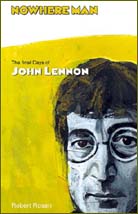 An Interview with Robert Rosen An Interview with Robert RosenExclusively for Absolute Elsewhere
ladyjean: Why did it take almost 20 years for the book to be published? Robert Rosen: One of the problems was that all mainstream publishers were afraid to touch the material. They were afraid of being sued by Yoko [Ono]. I had virtually memorized the diaries, and over a period of 20 years I was trying to figure out how I could communicate the information that was in the diaries without directly quoting from the diaries. I found that little bits and pieces of information from the diaries were coming out in various ways...in gossip columns, newspaper articles, other people’s books. And around 1994/1995, the Web exploded and I saw all these other things on the Web. What I was able to do was put together virtually all the information that was in the diaries from other sources. This was not really something I had been pursuing day in and day out, I would put it aside for years, but it would always keep coming back to me. I would see something, I would hear something, and it just wouldn’t quit. You know, the story really haunted me. lj: The way I understand it, from what you said in your book, you are basing your rewritten version on the actual diaries that you had in your hands at one point RR: I had the diaries for many months and I transcribed them...actually I transcribed them over and over, because the handwriting itself was very difficult to penetrate. Parts of it were written in code. And I just kept going at it, day in and day out for months, until I figured out what he was saying. I found that a lot of the material in his diaries was so compelling. The first thing I did after the diaries were taken from me...after I recovered from being in a state of shock...was sit down and recreate the diaries from memory. lj: I’m intrigued by this thing about code. What do you think John was trying to do? RR: I think it was a shorthand...that he wasn’t writing out people’s names. Things like that. It wasn’t really clear who the “O” was, or somebody’s initials. lj: In the book there was some woman who he called “A”. RR: Right. I actually didn’t figure out who that was until I read Albert Goldman’s book [The Lives of John Lennon]. I consider a lot of stuff in Albert Goldman’s book to be grossly exaggerated, but I did find the book useful for certain names. That would trigger some memory of something from Lennon’s diaries and I would be able to piece something together. That was part of the process that I was going through for 20 years.
lj: When John was writing in his journals, did it appear that he was writing quickly? RR: It would vary from day to day. There were days...there were years...that he really got into it and it was like a stream of consciousness. You know...everything he ate that day, everything he dreamed that day, every bowel movement. And then there were days, particularly towards the end, when he was working on Double Fantasy, and all his energy was going into the album. He just pretty much stopped writing. “Off to the recording studio...” would pretty much be what he would write about the whole day. lj: Some of the things he was writing were so eccentric...for example, his bowel movements. Did he describe that, or did he just write “I was constipated today”? RR: He didn’t go into detail. But say, he would smoke some weed and he’d pig out on some canolies or something, and it would give him indigestion, and he’d get diarrhea or constipated. lj: So when he was in that kind of a phase, he would write down everything he ate? RR: Yeah, he was really compulsive. On the other hand, when he got into something else, mainly the album, it was just three words per day. lj: When he was being compulsive about writing in the diaries, did it appear that that was all he really had in his life? RR: At times. There were years, there were months, there were weeks, where he was just extremely isolated. He seemed to be holed up in his bedroom, watching TV, smoking weed, and keeping the diaries. And looking out the window. That was pretty much it. Obviously he had contact with other people, but there were times when he was really, really isolated. lj: Do you feel that he was doing this, as he had with so many other things in his life, to document his life for historical purposes? RR: I don’t know if he was really thinking about doing it for history. This is only speculation...it wasn’t really clear exactly what he was doing...but it occurred to me that this could have been the rough draft for the “great memoir,” which he never had the opportunity to write.
RR: Obviously he was into documenting every moment. Keep in mind, too, that when he was keeping the diaries between 1975 and 1980, he was having very little contact with reporters. I think he felt that if somebody else wasn’t documenting what he was doing, then he would do it. It wasn’t only the writing, there were newspaper clippings. Every time something would turn up about him in the paper, he got really excited and he’d clip it and put it in his diary. It was all a part of the stream of consciousness. lj: It must have been amazing to look at those diaries. RR: It was one of the most amazing things that ever happened to me...creatively, journalistically, career wise...it was an incredible turning point in my life to have access to this. lj: You said you were also given audio tapes from Fred Seaman. How many of those were there? RR: There were boxes of them and I didn’t really have a chance to listen to it all. At some point, there was so much material being given to me I began to ask, “What are we talking about here, Fred, a lifetime project?” I felt that the diaries were the key to the project, the key to John’s life, and that’s what I concentrated on. I listened to some of the audio tapes. They were kind of interesting, but the diaries were far and away the most interesting. lj: You said you were also given some unseen, private videotapes. RR: I’ve seen some of that turn up in other places now. This was stuff that was taken out back at Cold Spring Harbor and in Bermuda lj: Were these things that Fred Seaman had been involved with and that’s why he had them? RR: Exactly. lj: You and Fred Seaman were friends before he started working for John? RR: Right. I met Fred back in 1973/1974 at City College. There was a newspaper there called Observation Post and I was the Editor in Chief, and Fred got involved. And we became friends. We lived down the block from each other. lj: At the point that Fred became employed by John, were you just automatically made privy to a lot of things? RR: From day one he started telling me everything that was going on. He’d call me a few times a week and tell me in detail what was going on with John and Yoko and Sean. He would come over to the house when he was in town. From the first day, it was a constant stream of information. lj: So you were hearing everything as it was happening? RR: He told me from the first day that he wanted to collaborate on a book about John. That this was a family obligation. He felt that his uncle Norman should have written a book. He felt that I was the person who was going to help him carry this out. lj: You hinted that John might have suspected this? RR: Well, Fred was a journalism major and John wasn’t stupid. It was bizarre to me. If you don’t want your private life to come out, then you don’t hire a journalism major as your personal assistant. What was he thinking? lj: It appears from what I’ve read over the years that John really trusted Fred...that he liked him. RR: I think he trusted Fred to some degree. I don’t know if “like” is the word. I don’t think John liked a lot of people. I think that it was very difficult for John to find a person to do the kind of job that Fred did. And Fred was in the right place at the right time. lj: But he must have been satisfied with Fred as his personal assistant.
lj: Are you and Fred still friends today? RR: I haven’t spoken to Fred in 20 years. When I came home from Jamaica, and found my apartment ransacked, and all the work I had done over the past year taken...that was pretty much the end. I had suspicions up to that point, but I kept tuning them out. He had been using me and I allowed myself to be used, because I was being given access to this amazing material. lj: Why did Fred steal all the stuff from your apartment? RR: Fred had been fired by Yoko. He was able to hook up with a businessman who was financing the project. And I think this guy convinced Fred to cut me out. lj: And Yoko didn’t even know the diaries were missing until she talked to you? RR: Right. It was the summer of 1982. When everything was stolen, I was absolutely horrified. I was in a state of shock. Everything was gone. For two weeks I was paralyzed. I couldn’t do a thing. But I eventually sat down and started recreating the diaries from memory. The more I wrote, the more I remembered. After a few months, I had a pretty thorough manuscript. And here I was, an unemployed freelance journalist with quite a story. So I started sending out query letters and one of the people I sent one to was Jann Wenner, the publisher of Rolling Stone. He wanted to meet with me and talk about this story of John Lennon’s diaries. So I told him, and he went to Elliot Mintz saying, “This freelance writer is coming around saying he has the inside story on John Lennon’s diaries...I have no idea who this guy is, but what he’s saying sounds true...I think you should look into this.” And that’s how it started. Eventually I met with Yoko and I told her what happened. lj: It appears from what you wrote in your book, that Yoko back stabbed you, too. RR: Well, Yoko kept my diaries for many, many years and she finally gave them back, just as the book was being published. I got most of them back. I don’t know what happened to a couple of them. My diaries contained all the stuff that Fred was telling me. Yoko wanted to see my diaries beginning with the day that Fred went to work for John up to the day she met me. So that was from January 1979 through August 1982. There were 16 different volumes. lj: So when you turned those over to her, she used that to get Fred, and then didn’t want to return them to you? RR: Exactly. I think it was that she wanted to punish me. lj: This leads to the question: What do you think of Yoko based on your personal experience with her? RR: At the moment...she returned my diaries. She’s not my friend, she’s not my enemy. I try to steer clear of her. But if I ran into her in the street, I would say hello. She’s not a person who inspires trust, but on the other hand, she’s not as totally evil as she’s been made out to be. You have to find some middle ground there. My lawyers are on speaking terms with her lawyers and no threatening words are being exchanged. I think that is the best situation you could hope for. lj: She accepted your book being published? RR: She didn’t try to stop it. I met with her attorneys and they wanted to read it before it came out. I think they eventually managed to get their hands on the galleys. I think there are things in the book Yoko would have preferred me not to say, but one of the strengths of the book is that I bent over backwards to be evenhanded. lj: I think you did a very good job in regard to that. Let’s backtrack a little. Based on what Fred was telling you on a regular basis about John, what was your opinion about John Lennon at that time? RR: Pretty much what I described in the first few paragraphs in the book, about this totally dysfunctional guy who was lying around raving about Jesus. Fred was convinced that John would never create again. He thought it was over. Because John was so dysfunctional, it seemed that Fred held him in contempt. His opinion changed completely when John started working on Double Fantasy, but up to that moment he was saying that John was a total waste. I don’t think Fred was totally off base, but on the other hand, I don’t think he realized that John was putting all his creative energy into his diaries. lj: Let’s get back to the diaries. You said some days he would be very, very detailed and then other days he would just scrawl out something. So there was no real consistency to them?
lj: It seems what we are getting in your book is just a glimpse of what you saw in the journals. RR: I could not say everything I wanted to say, because there were some things that I knew about that I couldn’t find an outside source to confirm. I was legally obligated not to quote from the diaries, and I cannot say that the book was based on the diaries. lj: How much information is still missing? RR: I tried to give the flavor of his dreams, for example, but I couldn’t really tell what was in the dreams. Some of the stuff about McCartney being busted in Japan, I couldn’t quite tell that story the way I wanted to. There was stuff about John and Yoko’s sex life I couldn’t confirm from another source, so I couldn’t get into it in the kind of detail that would have been more revealing...but not in a tawdry way. The trip to South Africa and the whore houses...I couldn’t go into the kind of detail I really wanted to. But there’s nothing that’s really vital that I completely left out. lj: Did he write at length about his attempt to achieve Yoga powers and spiritual perfection? RR: There were times that he meditated every single day. lj: He was trying to reach perfection in a physical body? RR: Yes. But he realized that he couldn’t do it. He realized that it was too difficult. He tried...with the fasting, with the yoga, with the meditation, with the vow of silence, with the prayer. lj: And this was a main goal that he wanted to achieve in his life? RR: That was one of his goals over the five-year house-husband period. He really wasn’t sure until right after he came out of it, that what he wanted to do was record the album. What he would have preferred was to emerge after those five years as a full-blown Yogi and psychic, but he couldn’t do that. He didn’t have the discipline to achieve that. When he realized that he couldn’t do it, he started focusing all his energy on Double Fantasy. lj: Did he go into detail about what he was achieving with the meditation, etc.? RR: He hinted at it. That’s why I had to do a lot of research into those things. Then it became clear to me that that was what he was doing. John’s problem was that a part of him longed for spiritual perfection, but the other part longed to hang out in his bedroom, smoke weed, and indulge in the carnal pleasures. Every facet of his life had that dichotomy and that’s what made him such a compelling personality. lj: Was there any indication in the diaries that there was a lot of drug use going on? RR: He liked smoking marijuana. And when he got mushrooms, he enjoyed taking those, too. There was a lot of talk about cocaine at recording sessions, and he might have briefly referred to it, but his drug choice during the years of isolation was marijuana.
RR: I don’t believe he was that tall. There has been controversy about exactly how tall he was. And 5’ 8’’ is an educated guess based on numerous things. I tried on some of his clothes and they fit. I’m 5’ 8’’ and they fit almost perfectly. It was a very eerie experience, putting his clothing on. I thought, “he must have been my height...I’m 5’ 8’’...” lj: How did you happen to be putting on his clothes? RR: It was part of the stuff that Fred was bringing over. The amount of stuff that he was bringing to my apartment was astonishing. Boxes were piled to the ceiling. lj: Among the people that you mentioned talking to in regard to the book were Rich and Greg Martello. Did they play a major role in this whole story? RR: Not really. They were just assistants in the front office. They were gofers. They just happened to be there the final year. I hung out with them. I was hanging around with people on the staff. lj: I have a series of related questions that I’d like to ask you. The first one is: In reading John’s diaries, what did you find most endearing about him? RR: His relationship with Sean. That was genuine. The guilt he felt over things. He was struggling with these very human problems, and the fact that he was probably the most famous man on the planet and had all this money didn’t really help. He was struggling in his own way. Money and fame just put his problems under a magnifying glass. lj: What was the saddest or most pathetic thing you discovered? RR: His personal life. His relationship with May Pang. It was so clear he was dying to be with her and he couldn’t do it. He wrote about that a lot. And then his relationship with Julian. He just couldn’t connect with Julian. That was sad. lj: What did you find to be the most shocking? RR: Obviously I knew about the rivalry with McCartney, and the jealousy, but I think the extent of it...how often he thought about McCartney, and how jealous he was...I found that pretty shocking. I found it shocking that he was so into money. And the emphasis that was put on the occult was pretty shocking. The extent that they got into it. lj: What would you most like the readers of this interview to know about John? RR: His diaries are such a vivid example of how money and fame are not going to solve your problems. It can exacerbate your problems. John’s biggest fantasy was just being in the same house with Sean and Julian and Yoko. It’s the simple things that make you happy. lj: What has been the general reaction to your book? RR: The book sold very well. It was a Los Angeles Times bestseller. It was a bestseller in the UK and Denmark. It’s out in Japan. It’s out in paperback in England. It’s coming out in Germany before the end of the year. All those things are very satisfying. There were some wonderful reviews, some wonderful articles. The book obviously sparked a lot of controversy. I’m just very happy that after all these years, for the most part, people responded very well to the book. People have told me how human John seems to them after reading the book. They feel closer to him, and they like him more. The positive feedback has been overwhelming. lj: Do you have any regrets about your involvement in this whole thing? RR: Only if the book had never been published. It was a very difficult thing to live with this for 20 years. It was such a relief when the book was finally published and people starting buying it. Things turned out very well. I have no regrets. It finally launched my career as a writer. I’m very grateful to John Lennon, because he’s responsible for this. All’s well that ends well. Copyright © 2001-2008 ladyjean / AbsoluteElsewhere.net /Jean Teeters Robert Rosen was born in 1952 in Brooklyn, New York. He is currently working on a book about the history of modern pornography. He expects to have it completed by the end of the year. Keeping track of all the information in John's diaries must have been difficult. Today writer's have a variety of software options to organize their work. Programs are created to organize all kinds of work and businesses, from writing and editing to attorney case management software. |

 Absolute Elsewhere's ladyjean talked
Absolute Elsewhere's ladyjean talked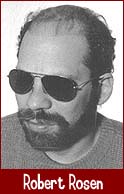 As fate would have it, Robert Rosen was offered the opportunity of a lifetime, when the personal diaries of the late John Lennon were suddenly and unexpectedly put in his hands in 1981. After almost 20 years, Rosen’s account of what Lennon wrote in those journals (based on his own recollections and personal experiences) was recently published. How did Rosen happen to receive the diaries? What hidden aspects of Lennon’s reclusive life was revealed in them? Why did it take so long for the story about the diaries to come to light? These and many other questions are answered in the following interview that I conducted with Robert Rosen on August 21, 2001. ~ladyjean
As fate would have it, Robert Rosen was offered the opportunity of a lifetime, when the personal diaries of the late John Lennon were suddenly and unexpectedly put in his hands in 1981. After almost 20 years, Rosen’s account of what Lennon wrote in those journals (based on his own recollections and personal experiences) was recently published. How did Rosen happen to receive the diaries? What hidden aspects of Lennon’s reclusive life was revealed in them? Why did it take so long for the story about the diaries to come to light? These and many other questions are answered in the following interview that I conducted with Robert Rosen on August 21, 2001. ~ladyjean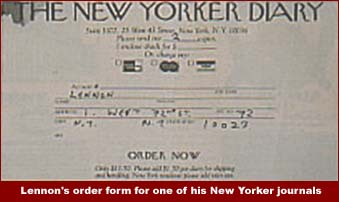
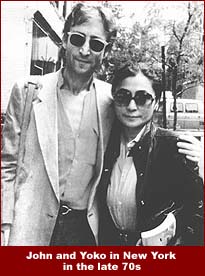 lj: He and Yoko had been very into documenting everything about their lives, so I was wondering if this might have been a part of that.
lj: He and Yoko had been very into documenting everything about their lives, so I was wondering if this might have been a part of that.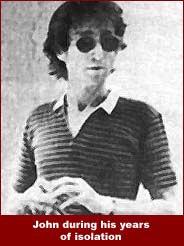 RR: There were things in John’s diaries that indicated that he wasn’t exactly happy with Fred. But Fred managed to keep the job. I don’t think John could have found anybody who would have been exactly what he wanted. I think he kind of wanted a machine, and unfortunately it required a human being to do the job. Fred did something to me that I found unforgivable; he ransacked my apartment. And yet, I still feel a certain kind of sympathy for what he went through. The exposure.
RR: There were things in John’s diaries that indicated that he wasn’t exactly happy with Fred. But Fred managed to keep the job. I don’t think John could have found anybody who would have been exactly what he wanted. I think he kind of wanted a machine, and unfortunately it required a human being to do the job. Fred did something to me that I found unforgivable; he ransacked my apartment. And yet, I still feel a certain kind of sympathy for what he went through. The exposure.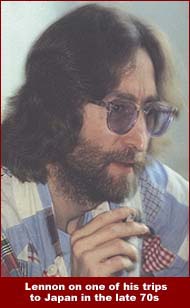 RR: He would be consistently writing thousands and thousands of words for days, weeks, and months. And that would go on for several years, when he was most isolated. Sometimes he’d take a separate piece of paper and glue it into the journal and write a couple of extra thousand words on it. When he was off on those extended stays in Japan, just hanging out in his hotel room, not doing anything, he’d just be writing and writing. In 1977 or 1978, he really got into programming his dreams. He would write down in excruciating detail every little thing about his dreams. There were times when he wrote more about his dreams than his waking life.
RR: He would be consistently writing thousands and thousands of words for days, weeks, and months. And that would go on for several years, when he was most isolated. Sometimes he’d take a separate piece of paper and glue it into the journal and write a couple of extra thousand words on it. When he was off on those extended stays in Japan, just hanging out in his hotel room, not doing anything, he’d just be writing and writing. In 1977 or 1978, he really got into programming his dreams. He would write down in excruciating detail every little thing about his dreams. There were times when he wrote more about his dreams than his waking life.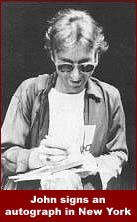 lj: When you talked about John’s compulsion with his weight and his fasting, you say that he was 5’ 8’’. For over 35 years, it’s been thought that he was 5’ 11’’.
lj: When you talked about John’s compulsion with his weight and his fasting, you say that he was 5’ 8’’. For over 35 years, it’s been thought that he was 5’ 11’’.